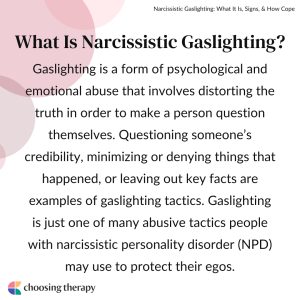Toxic narcissists often use gaslighting in divorce cases to manipulate their spouses and maintain control. Gaslighting—a form of psychological abuse where the narcissist distorts reality to make their spouse doubt their perceptions, memory, or sanity—serves several purposes in this context:

-
Power and Control: Narcissists thrive on dominance. By gaslighting, they undermine their spouse’s confidence, making them question their decisions, such as pursuing the divorce or asserting their rights. This can weaken the spouse’s resolve and give the narcissist leverage in negotiations or court proceedings.
-
Deflecting Blame: Narcissists rarely accept fault. Gaslighting allows them to rewrite events, portraying themselves as the victim or denying their abusive behavior. For example, they might claim their spouse’s accusations of infidelity or emotional abuse are exaggerated or imagined, shifting focus from their actions.
-
Emotional Manipulation: Gaslighting destabilizes the spouse, keeping them emotionally off-balance. This can make the spouse more likely to concede to unfavorable terms, like giving up assets or custody, out of exhaustion or self-doubt.
-
Maintaining Image: Narcissists are obsessed with their public persona. Gaslighting helps them control the narrative, convincing others (including lawyers, mediators, or judges) that they are reasonable while their spouse is unstable or irrational.
-
Punishment: Divorce threatens a narcissist’s ego, as it represents rejection. Gaslighting becomes a tool to retaliate, causing emotional harm and prolonging their spouse’s suffering as a form of vindictive control.
This behavior stems from the narcissist’s deep-seated need for validation and inability to handle criticism or loss. It’s not about logic but about preserving their sense of superiority. If you are dealing with a toxic narcissist in your marriage, and need family law advice please feel free to contact our office for information and legal support.
 Illinois Divorce Lawyer Blog
Illinois Divorce Lawyer Blog

